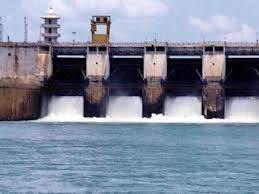Mandya, Feb 10: As protests against Cauvery water release to Tamil Nadu continued in the district today, the local administration banned entry of tourists inside the Krishnaraja Sagar Reservoir (KRS) complex till February 13 as a precautionary measure.
Prohibitory orders which were in force in and around KRS from February 7 till this morning, had been extended by another three days, police sources said.
Security has been beefed up and nearly 300 police personnel were guarding the dam, a famous tourist attraction, police said.
Karnataka began releasing water from the KRS yesterday complying with the Supreme Court order directing it to supply 2.44 tmc ft to Tamil Nadu to save the standing 'samba' paddy crop in the delta districts.
The district administration warned agitating farmers that if they defied prohibitary orders, appropriate action will be initiated against them in accordance with law.
President of Cauvery Protection Committee G Madegowda demanded the resignation of Chief Minister Jagadish Shettar for his 'failure' to protect the interest of the state's farmers.
The BJP Government has decided to file a petition in the apex court tomorrow seeking reivew of its order citing depleted storage in Karnataka reservoirs.
Speaking to reporters in Shimoga, the Chief Minister said, "we have strictly obeyed the order of Supreme Court regarding release of Cauvery water to Tamil Nadu."
He said the state was filing a review petition before the apex court.
Also, the state was waiting for the Supreme Court order on its review petition, seeking postponement of local body elections in the state.
On the power situation, he said, things had not worsened and there was no need for purchasing power from outside the state.
Laying the foundation for works worth over Rs 300 crore in the district, Shettar said the power generating unit in Udupi was ready and would ease out the shortage.





Comments
Add new comment